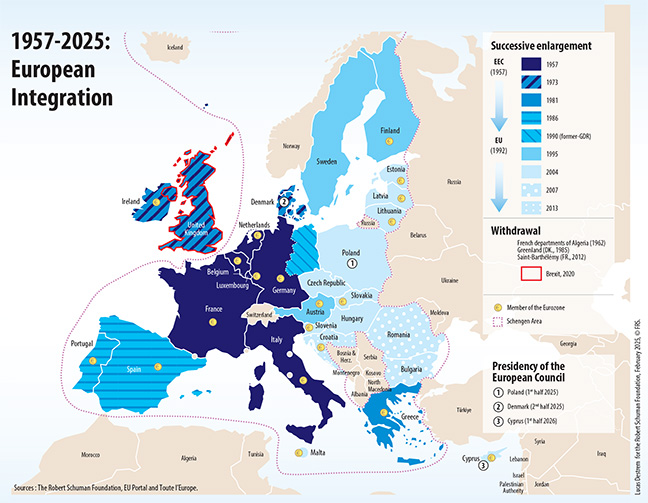Two-Tiered Europe
Jean-Dominique Giuliani
-

Available versions :
EN

Jean-Dominique Giuliani
For several years, the European Community has been treading water. Not because it has not taken any action. No! It has developed a particularly large corpus of rules, to the point that it has sometimes gone too far. It has initiated new industrial and financial policies, even venturing into defence issues.
But political union has not really progressed and despite the energy and consistency of the President of the French Republic, despite the clouds that have gathered in the geopolitical landscape, Europe's security and defence issues have not found answers within the European Community and Europe's defence has suffered as a result.
It has taken two Russian invasions of Ukraine, an information and digital war waged by the Kremlin’s dictator and the election of an atypical American president for Europe to consider unprecedented progress.
The process of acceleration has been prompted by this combination of factors, but above all by the method that has been imposed.
Security and defence issues cannot easily be taken forward by initiatives from the Commission or the European Parliament. They can only really progress based on the will of the Member States once they are convinced of a need or, better still, an urgent necessity, because in these areas, initiatives from the common institutions most often give rise to tension and rejection within national administrations.
The Covid-19 health crisis and the Russian war in Ukraine have pushed Member States to seek common solutions to situations they do not feel they can face alone. These decisions have taken the form of coordinated actions or common policies, the management of which has often been delegated to the common institutions, which are now indispensable.
75 years after the Schuman Declaration on 9 May 1950, the method remains the same: ‘... By concrete achievements which first create a de facto solidarity...’
And what about the context?
Historians have shown that the insistence and audacity of Jean Monnet and Robert Schuman stemmed from the fear of seeing the Cold War rapidly degenerate into open conflict. Are we so far from that today?
As we have often demonstrated, in Europe we have long since moved beyond the terms of old debates on the form and purpose of European integration.
The European Union is more federal than the most ardent federalists could have ever dreamed of in terms of the policies entrusted to it; it is more intergovernmental than the most ardent sovereigntists could have ever dreamed of because of the powers that it has not been granted.
Co-operation in the fields of defence and security to preserve peace under threat is therefore a considerable step forward, enabling Europeans to reconcile, to strengthen and to express themselves as a united force. Faced with the return of war to the continent, the United Kingdom has joined them, the States have decided to rearm, heads of state and government are speaking out strongly alongside Ukraine and have even entrusted their chiefs of staff with the task of implementing their decisions.
Faced with the Russian challenge and American abandonment, Europeans find themselves almost naturally in a common fight: it is as much cultural as it is political.
For the rule of law, democratic and social practice, openness to the world, the place of culture and education, a European model exists that must be assumed through pride in belonging and the will to promote it.
We are not America, certainly not Donald Trump's America.
We are not Russia, certainly not Vladimir Putin's Russia.
The gulf that exists between us and these two self-proclaimed empires is very deep. It concerns the firm belief, translated into law, that respect for the human person is central to everything and must be the main value around which society is organised.
And the unrest that can affect us through domestic free protest or foreign manipulation does not seem to weaken the support of European citizens for this premise, which is shared by many peoples far from our borders.
The long term is the only judge of civilisations.
It is not the dangers of the moment that should obscure what Europeans have managed to build over millennia, with so many upheavals and doubts. On the contrary, they must strengthen them in a necessary effort to avoid reliving the worst moments of their history.
To overcome the current difficulties, Europe has no choice but to reform, strengthen and assert itself. It seems to have realised this as a matter of urgency. A real acceleration process is at work, not only in history, but also in Europe and in terms of its integration.
The contributions contained in this book offer many reflections and concrete avenues to achieve this.
The Schuman Report on Europe, the State of the Union 2025, of which this text is the preface, will be available on the Foundation's website on 3rd June in French and will be available soon in English. This work was produced under the direction of Pascale Joannin and is published by Hémisphères.
Publishing Director : Pascale Joannin
On the same theme
To go further
European Identities
Patrice Cardot
—
10 February 2026
The EU and Globalisation
Olena Oliinyk
—
3 February 2026
Strategy, Security and Defence
Jean Mafart
—
27 January 2026
The EU and Globalisation
Iana Dreyer
—
20 January 2026

The Letter
Schuman
European news of the week
Unique in its genre, with its 200,000 subscribers and its editions in 6 languages (French, English, German, Spanish, Polish and Ukrainian), it has brought to you, for 15 years, a summary of European news, more needed now than ever
Versions :





